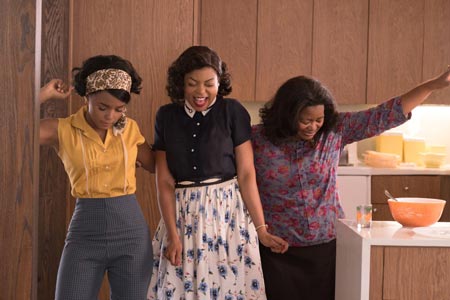Film (2016)
Directed by Theodore Melfi
Screenplay by Allison Schroeder and Theodore Melfi
Based on the book Hidden Figures: The Story of the African-American Women Who Helped Win the Space Race
by Margot Lee Shetterly
With Taraji P. Henson (Katherine G. Johnson), Octavia Spencer (Dorothy Vaughan), Janelle Monáe (Mary Jackson), Kevin Costner (Al Harrison), Kirsten Dunst (Vivian Mitchell), Jim Parsons (Paul Stafford), Mahershala Ali (Colonel Jim Johnson)

Taraji P. Henson as Katherine G. Johnson
Octavia Spencer as Dorothy Vaughan
in “Hidden Figures”
Photo: Hopper Stone/Hopper Stone, SMPSP
© TM & © 2016 Twentieth Century Fox Film Corporation
All Rights Reserved.
Not for sale or duplication.
This affecting and in many ways heartbreaking film is about brilliant women who contributed significantly in scientific ways to the first NASA manned space programs in the early 1960s, and who, as African-Americans, suffered the indignities that were prevalent at that time.
The film focuses principally on three of these women – Katherine G. Johnson (Taraji P. Henson), Dorothy Vaughan (Octavia Spencer) and Mary Jackson (Janelle Monáe) – who, as talented students of science, mathematics and engineering – were hired as human “computers” for the space project just before data processing machines were employed in the program. Teams of these so-called computers were given the job of doing the various endless calculations necessary to compute flight trajectories and miscellaneous other relevant results to provide support for flight planners and controllers.
Katherine Goble Johnson’s story provides central dramatic focus. As a youthful math prodigy, she had shone, but, given the discrimination against women and blacks, it was impossible for her to become a full-fledged engineer. Nonetheless, on the NASA flight planning team, she demonstrates her true talents, and is called upon to provide authoritative calculations of trajectories at various dramatic junctures.
The racist elements that enter in – whether having to use separate bathrooms or separate coffee pots – are vividly omnipresent, and startling now as prevalent practices fifty years ago.
As ***, *** is dignified and plausible. Octavia Spencer, as Dorothy Vaughan, the aspiring manager of the computing group, is feisty, confident and deliberate in her challenge to the racist practices that prevent her from gaining the authority she deserves. As Mary Jackson, Janelle Monáe conveys a stylishly intelligent demeanor, and has a terrifically convincing and eloquent moment when she appears before a Southern judge to make an appeal to get a variance to attend engineering classes in a traditionally white school.
AS the boss of the engineering group, Al Harrison, Kevin Costner does a creditable job, rising to moral authority when required to deal with taking an African-American woman into his group and to challenge segregationist policies about bathrooms and coffee machines when required.
Kirsten Dunst (Vivian Mitchell) plays a disdainful and hard-edged manager whose moody unpleasantness becomes the racial barometer of the times, and which gradually adjusts as changes occur in the institution.
The script by Allison Schroeder and Theodore Melfi is deftly written. Taken from a fairly straightforward, but shockingly revealing, story about the combined dramas of racism, sexism and the space shots themselves, it provides plenty of narrative punctuation and never lags.
Artfully directed by Theodore Melfi, it is also an incredibly moving film, generating its effects subtly but persuasively.
Some of the funniest lines are cool, precise and sharp comments made by the three women in response to white colleagues who are clueless about racism.
This deftly named title does not itself really suggest the plight of these amazing women, but it does give a sense of their forced obscurity in a context in which they played crucial roles in calculating the figures that enabled the early manned space launches to succeed and helped NASA, and the United States, to shine.
– BADMan
Leave a Reply